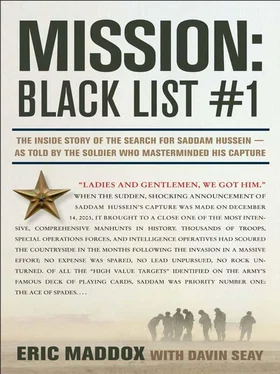While I now felt comfortable sharing the food in the kitchen, I drew the line at the beer stashed in the refrigerator. The shooters would bring in a couple of cases when they went to Baghdad, but I always assumed it was off-limits. They rationed themselves pretty carefully, and I never saw any of them drink more than a beer a night. They never knew when they might be called out on a hit.
It was all the more significant then when, after a grueling twelve-hour interrogation, Jeff offered me a cold beer. Jeff was a hard man to know. He stood out even among this group of men who kept to themselves and never showed what they were feeling. The fact that he offered me a beer was a major act of friendship. After that we regularly shared a cold one after a long day of work.
There was another break from my routine when football season started. The 2003 college football season was a time of high hopes for all true Sooners. We were coming in ranked number one in the polls and, over the last three years had lost only four games and won a national championship. As far as I was concerned, it wasn’t a matter of whether we were going to win the national championship, but by what margin.
In Iraq the Armed Forces Network would broadcast the games on Saturday evening, starting around 1900 and usually run all night. OU was so good that year that I expected most of the games to be aired. My goal was to finish all my interrogations in time for the first kickoff.
But it didn’t always work out that way. In the first week of September, the Sooners had a bye week and the Texas Long-horns, the Sooners’ archrival, were playing the Arkansas Razorbacks. I had been eagerly anticipating the game and by 1500 I was on my last interrogation. I was going to be in front of the TV set no matter what.
It was then that the war intervened. Rich arrived at the guesthouse with news that the Iraqi police had arrested Nasir Yasin Omar Al-Muslit. I knew only too well who the new prisoner was. Aside from being still another Al-Muslit, Nasir was an inner-circle bodyguard. He was reputed to be one of the last people seen with Saddam at the start of the war. He was also, of course, well connected within the Hamaya chain of command. He was the brother of Farris Yasin, who was supposedly running the insurgency group around Al-Alam and was the cousin of several other high-ranking Al-Muslits.
I knew I needed to talk to him, but I was hoping it could wait. The game was about to begin. By the time Rich got through in-processing him, it would be too late to start an interrogation. Maybe this could wait until tomorrow.
No such luck. The processing procedure was going to be delayed. He would be shipped to BIAP shortly. We had to talk to him right away. Swearing under my breath, I settled in for a long night of work.
Nasir made an immediate impression. A couple of inches under six feet, he easily weighed two hundred fifty pounds and had been roughed up pretty badly by the Iraqi cops who had arrested him. But he didn’t seem intimidated by the situation and showed no fear or the slightest trace of nerves. My first impression was that getting anything from this guy was going to be a chore.
It was. For the first several hours, he had his story and he stuck to it: He claimed he had no contact with his extended family and friends and was living peacefully at home with his wife and kids since the war began. I did everything I could think of to shake his self-confidence, but he wouldn’t break. Finally, with Adam the terp getting hoarse from echoing my yelling and screaming, we took a break. I went back to the house to get something to eat. A group had gathered around the television. The game was in the last five minutes and Texas was getting their asses kicked. Go Razorbacks!
The prospect of the Sooners’ mortal enemies getting trounced provided fresh motivation. I knew Nasir could give me invaluable information on the inner workings of the Hamaya. I just didn’t know how to get it out of him. I returned to the guesthouse and started again, this time asking general questions about his life and his job. I was fishing for something, anything, that might point me in the right direction.
Slowly, over the course of the next few hours, the prisoner began to open up. Obviously he wasn’t going to tell us where we might find any of his family members who were still in hiding or overseeing the insurgency. But the details of his everyday life were not out of bounds. Answering simple questions would give him the appearance of being honest and innocent and doing his best to cooperate.
What Nasir confided was a blueprint to the operation of Saddam’s bodyguards. At any given time, he explained, there were thirty-two inner-circle Hamaya, divided into two sixteen-man teams on separate shifts. Each team had a leader—the Marafiq—and he provided me with their names. He also gave me the names of twenty-nine of the thirty-two inner-circle bodyguards along with their ranks. It was interesting to note that rank didn’t necessarily convey power within the inner circle. Rank was based solely on time of service. Power was about family connections and proximity to Saddam, and a major with good connections could carry more authority than a full-bird colonel.
I may have missed an important game, but at the end of my session with Nasir, I had learned two crucial things. First, we finally had a way into the inner circle of Hamaya, the ones most trusted by Saddam. It was no longer about an endless fraternity of relatives popping up at random intervals. Since my arrival, I had been working off the list of two hundred bodyguards of varying importance that Jared had given me. I could now concentrate on just thirty-two of them. While I still wasn’t sure where those thirty-two might eventually take me, at least it was a manageable number.
The other important takeaway was that it wasn’t always necessary to break a prisoner in order to get good information. I was never able to frighten or intimidate Nasir into telling me what I wanted to know. But just by talking with him about his life as a bodyguard, I learned more than I had from a dozen other interrogations. The fact was, Nasir was a prime example of a prisoner whose guilt or innocence didn’t really matter. I was in the business of getting information and it didn’t matter if the source was good, bad, or indifferent, as long as he had what I needed. And I could find a way to get it out of him
It was shortly after OU whipped UCLA in late September that Sergeant Olsen approached me again about some other sources he had been developing.
This time it was a trio of guys who lived east of the Tigris not far from Al-Alam. Olsen called them the Three Amigos. He wanted me to talk to them because they claimed to have knowledge about the Al-Muslits, specifically Radman Ibrahim.
Radman was the cousin of Nezham, whom we’d been after on the raid the night I first arrived in Tikrit. I’d since found out that Radman had been an administrator for the inner circle of Hamaya and was considered one of the most powerful members of the bodyguard elite. Olsen’s three sources claimed that this high-ranking Al-Muslit still occasionally visited a farm he owned in the area north of Tikrit. They were offering their services to let us know the next time he showed up.
“Why are you willing to help us capture him?” I asked them after they’d been brought over to the guesthouse.
“We want to work for the governor of Tikrit,” the self-appointed spokesman replied. “Maybe you will put in a good word for us.” The fact was, these three didn’t really have much of a connection to Radman. All they had was a vague idea of his whereabouts and his role in the insurgency. But at least their enthusiasm counted for something.
“But we will need vehicles, weapons, and telephones to do the job,” added another amigo.
Читать дальше












